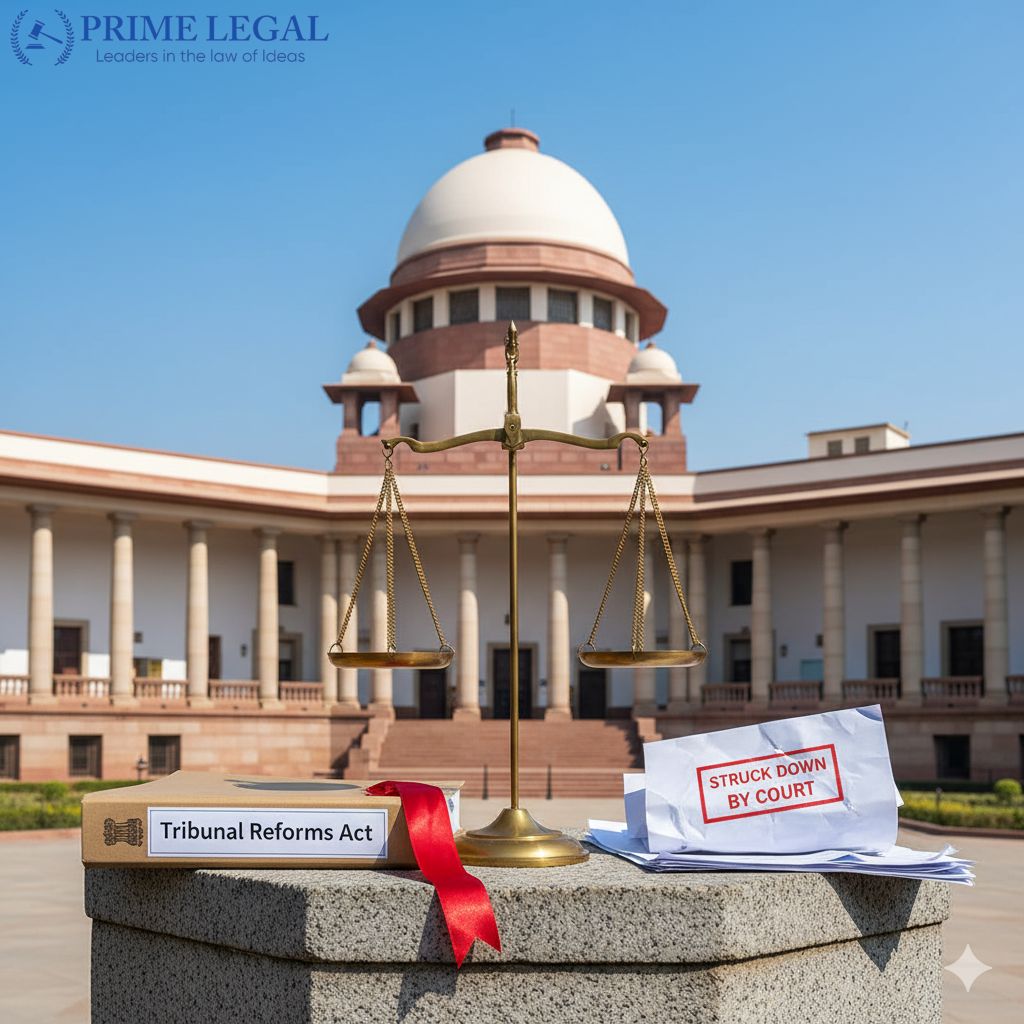INTRODUCTION
In the development that highlights the balance between legislature and judiciary, the Supreme Court of India examined whether Parliament can re – enact provisions of law that have already been struck down as unconstitutional. The dispute arises during the hearing of petitions challenging the Tribunals Reforms (Rationalisation and Conditions of Service) Act, 2021, over re-introduction of the provisions which were earlier struck down by the Supreme Court as unconstitutional. The case has reignited the debate on the separation of powers and judicial independence.
BACKGROUND
India’s tribunal system was created to reduce the burden on traditional Courts and bring in technical expertise in areas such as taxation, corporate law and administrative disputes. The 42nd Constitutional Amendment (1976) introduced Articles 323A and 323B which grants parliament and state legislatures the power to establish tribunals. However, executive interference has persisted for decades.
The tussle between the judiciary and the executive began intensifying after the Finance Act, 2017, which granted the government control over tribunal appointments and service conditions. The Supreme Court in Rojer Mathew v. South Indian Bank Ltd. [2019 INSC 1236] struck down these rules for violating judicial independence. Despite this the government issued new rules and later promulgated the Tribunals Reforms Ordinance, 2021, which the Court again invalidated in Madras Bar Association v. Union of India [(2021) 7 SCC 369]. A month later the Parliament enacted the Tribunals Reforms Act, 2021 stating similar provisions.
KEY POINTS
- The Madras Bar Association (MBA) has challenged the 2021 Act, alleging that it undermines judicial independence and violates the separation of powers.
- The Parliament re – enactment of the provisions such as four – year tenure and a minimum appointment age of 50 years which the Supreme Court had struck down and declared those as unconstitutional.
- The Chief Justice of India Justice B.R Gavai observed that while parliament can legislate it cannot simply re – enact a law which was earlier struck down without addressing the judicial reasoning behind its validation.
- Attorney General R. Venkataramani argued that Parliament’s power to legislate remains intact and that the 2021 Act was passed after “detailed deliberations.” He termed it a “balanced framework” aimed at combining judicial independence with administrative efficiency.
- The debate on tenure and reappointment over a five – year tenure with a possibility of reappointment ensures both experience and accountability. In reply to which the petitioners argued that short tenures make members susceptible to executive influence.
- Several tribunals including NCLT, Armed Forces Tribunal, and ITAT are facing acute staff shortages rendering them virtually defunct.
RECENT DEVELOPMENT
During the last hearing, a bench led by Chief Justice B.R. Gavai and Justice K. Vinod Chandran pressed the Union government to justify how Parliament could re – enact provisions already invalidated by the Court with only minor changes. The Chief Justice of India highlighted that the real issue was not legislative competence but legislative overreach, cautioning that such repetition without addressing prior judicial findings erodes the rule of law.
The Attorney General reiterated that the 2021 Act incorporates accountability and efficiency measures and does not compromise judicial independence. However, the Court remained unconvinced, observing that the legislature must remedy the constitutional defects identified in prior judgments rather than reintroduce the same clauses.
CONCLUSION
This case embodies a critical constitutional tussle between Parliament’s legislative supremacy and judiciary’s power of judicial review. This case raised the fundamental question as Can Parliament re-enact laws that the Supreme Court has already invalidated, without curing the constitutional defects?
As the Supreme Court examines the contours of legislative overruling and judicial independence the outcome of this case will not only shape the future of India’s tribunal system but also reaffirm the delicate balance of power between the legislature, executive and judiciary.
“PRIME LEGAL is a full-service law firm that has won a National Award and has more than 20 years of experience in an array of sectors and practice areas. Prime legal falls into the category of best law firm, best lawyer, best family lawyer, best divorce lawyer, best divorce law firm, best criminal lawyer, best criminal law firm, best consumer lawyer, best civil lawyer.”
WRITTEN BY- SUSMITA ROYCHOWDHURY


